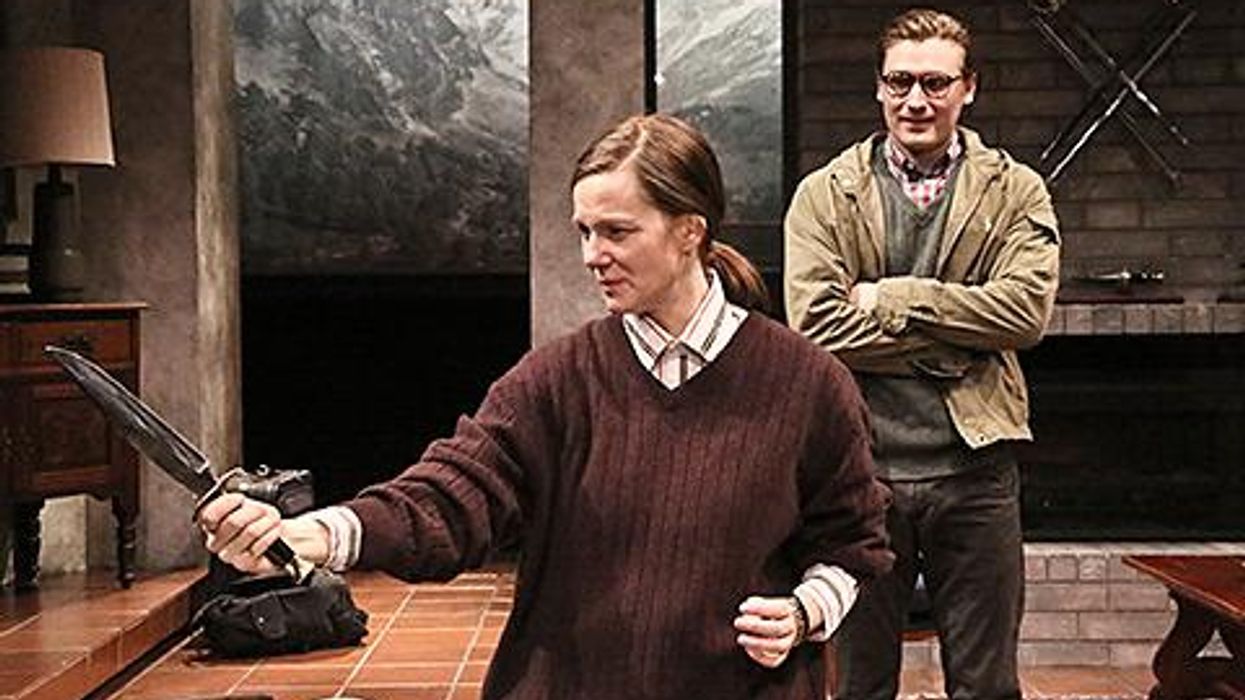It’s the early 1990s, and author Patricia Highsmith is hunkered down in her home in Switzerland, suffering from writer’s block and having recently received a diagnosis of cancer. A mysterious young man arrives at her door, claiming to be a representative from her publisher, wanting to check the progress of the latest installment in her series of novels about the clever, amoral Tom Ripley.
A contest of wills and a series of revelations ensue onstage in Switzerland, which playwright Joanna Murray-Smith says she designed to be “a play about Patricia Highsmith in the style of Patricia Highsmith.”
Switzerland opened March 6 at Los Angeles’s Geffen Playhouse, which commissioned the work and is presenting it as a co–world premiere with the Sydney Theatre Company in Australia, where it was staged it last fall. The Geffen production, directed by Mark Brokaw, stars Laura Linney as Highsmith and Seth Numrich as her visitor. It’s a psychological suspense drama that “asks serious questions about the relationship of writers and their work,” but it has moments of humor too, says Murray-Smith.
Murray-Smith has a history with the Geffen; it’s presented two of her other plays, The Female of the Species and The Gift. When the idea of a commission arose, she told Geffen staffers this was the play she wanted to write, and they enthusiastically took her up on it.
The idea for the play, says the Melbourne-based Murray-Smith, came to her during a previous stint at the Geffen, when she wondered into a nearby shop (since closed) specializing in mystery books and noticed several by Highsmith, who’s best known for Strangers on a Train, the Ripley series, and the pseudonymously penned lesbian classic The Price of Salt. “From that point I became pretty obsessively interested in Highsmith,” she says.
But if her interest in Highsmith wasn’t always obsessive, it was always there. As a little girl, she watched her mother devour Highsmith’s novels. “I remember being intrigued with a writer who could hold my mother’s attention so well,” she recalls. When Murray-Smith was old enough, she started reading Highsmith too.
“She wedded such a ferocious intellect with suspense,” the playwright says. “Her books were really sophisticated, in a genre not known for being sophisticated.”
Highsmith was not only a brilliant writer but a famously difficult and often unpleasant person. “She was such a strange and forceful personality,” says Murray-Smith. “People loathed her because she was so bitter and twisted,” yet were also drawn to her because of her intelligence and charisma. “She was in many ways like one of her characters.”
There were some challenges in writing about a real person, but Murray-Smith says she made an effort to portray Highsmith accurately. “Although the situation in the play is completely invented, I always tried to stay true to what I knew about her,” the playwright says. That extends to Highsmith’s sexuality; she “flirted with heterosexuality,” Murray-Smith notes, but eventually came to recognize that she was a lesbian.
“That is definitely referenced in the play,” Murray-Smith says, adding that Highsmith’s visitor “becomes something of a truth-teller,” and one of the truths Highsmith must confront is that she has often been attracted to cruel women.
Murray-Smith, who is straight, says she’s definitely an ally of LGBT people. “I would like to say, ‘Who isn’t?’” she says, while recognizing that’s rather idealistic. “I’m just interested in people.”
She’s happy to be back at the Geffen, which is “like a theatrical home away from home for me,” she says. She’s also thrilled to be working again with Linney, who was in Murray-Smith’s play Honour on Broadway 17 years ago and has remained a friend. “It’s wonderful to be back in a rehearsal room with her,” says the playwright. Both Linney and Numrich give excellent performances, she says.
At right: Joanna Murray-Smith
One sad note, she adds, is that Geffen founder Gil Cates, who championed her Highsmith play, didn’t live to see it performed. He died in November 2011.
Several theater companies have expressed interest in staging Switzerland after it concludes its Geffen run in April, but there’s nothing definite yet, says Murray-Smith. Meanwhile, when she returns to Melbourne she’ll spend some much-needed time with her family — she is married to arts journalist Raymond Gill, and they have two sons and a daughter. She also has a variety of other projects in the works.
She’s writing a play for the Sydney Theatre Company, as yet untitled; it’s a family drama with all female characters. She’s fine-tuning another play, American Song, which will have its world premiere at the Milwaukee Repertory Theater next spring; the subject, broadly, is “guns in America,” she says. She’s written a film, Palm Beach, about college friends reuniting in their 60s, that may get made this year. And she’s written the libretto for an opera, The Divorce, to be filmed for Australian TV.
For those who can’t get enough of Highsmith, there are other projects out there related to her. A fall release is likely for Carol, the 1950s-set Todd Haynes film based on her lesbian love story The Price of Salt; the cast includes Cate Blanchett, Rooney Mara, Sarah Paulson, and Carrie Brownstein. Another film from a Highsmith novel, The Two Faces of January, got only a limited release last year, but it’s available on DVD and VOD; the suspense tale stars Kirsten Dunst, Viggo Mortensen, and Oscar Isaac.
And if you’re in L.A., you can see Switzerland at the Geffen’s Audrey Skirball Kenis Theatre through April 19. Click here for tickets and information. And go here for SheWired’s “Who the F Is…?” feature on Highsmith.























































































 Cindy Ord/Getty Images
Cindy Ord/Getty Images

























